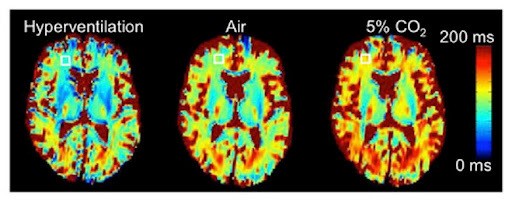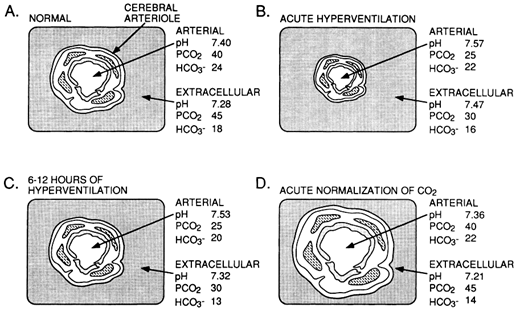What Breathing “Wrongly” Does To Your Brain and All It’s Fluids…

Over-breathing affects all of your body. Do you get headaches?
The article below leaves no doubt whatsoever that even mild over-breathing (hyperventilation) CHANGES flow to your brain, plus all the fluids in your brain.
I know you think you don’t over-breathe. And you will continue to think that – until you do a breath hold test which will likely (75% chance) confirm that you breath at least 50% more than your metabolic needs. (I will tell you how to do that soon.)
But if you did over-breathe, what would happen in your brain?
Simply – your “cerebral blood flow” (CBF) reduces directly in line with the drop in Carbon Dioxide that happens when you breathe too much.
You know how you get dizzy when you over-breathe A LOT? Well that is because you can reduce the blood flow to your brain by 40% by doing it. And when you only over-breathe a little – you don’t get dizzy – but you can and do get other effects.
Like headaches. In the images below – you can SEE how the blood pipes get smaller and smaller as you over-breathe more.

Not only that, but the pH of your brain fluids is altered, not in a good way. You can read the article by this leading anesthetist – but you will need your medical dictionary handy.
They use over-breathing to reduce blood supply to your brain when they operate on it.
Your brain is designed to be happy when we have the right level of breathing. You may have been told that “breathing more will give you more oxygen, and make you healthier” – but it is exactly wrong on both counts.
No matter how much you increase your breathing – it is impossible to increase your oxygen levels past the levels that normal breathing gives you. 100% full is 100% full.
But over-breathing reduces your levels of CO2 (carbon dioxide) – and this not only messes up most of the chemistry in your body, causes your air and blood pipes to constrict, but also actually reduces the available FREE oxygen you think you want.
If you can hear or see your breathing at rest – you are over-breathing. How many of the physical symptoms in your life – are caused or made worse by your over-breathing?
How much of the “dazed” or “slightly dopey” feeling you sometimes get is your breathing? Or if more severe – your low energy levels, tiredness, dull headaches, and lethargy?
The lower your normal levels of bodily carbon dioxide – the more sensitive you are to it when you hold your breath.
Breathing You Can Do RIGHT NOW – Are YOU Over-breathing?
- As a test right now – take a normal breath in, allow a normal breathe out (don’t push it out, just let it out), then with your mouth closed – pinch your nostrils and hold your breath.
- Hold it ONLY until feel the definite desire to take a breath – this means not as long as you can hold – just until you want a breath.
- If you do it right (and you will likely hold too long the first times you do it) then your breathing after the hold is NOT increased.
- So do this measurement now.
How many seconds did you hold comfortably for?
- A time of over 45 seconds is good. Anything less than that means you are over-breathing and your CO2 levels are low.
- Under 20 seconds will mean that you are over-breathing a lot. When my measurement was under 20 seconds I had asthma symptoms. Once I got to to always being over 24 seconds – they stopped.
- If your measurement around 10 or less – then you have a significant health problem.
With severe asthma and emphysema measurement will often be almost zero seconds. Even the smallest hold is too long.
So if the blood supply to our brains is decreased by over-breathing even a little – things are not quite as good as they could be, right?
By the way – as you have a quick look at the clinical paper below – you might wonder how much of this information your GP or even specialists is aware of? Have you been told to breathe deeply, and to “get the stale air out”? It makes my blood boil when I think about this stupidity. Completely 100% wrong.
The chemistry of breathing can be followed by a 12 year old. The medical profession has NO EXCUSE for the ignorance on breathing that most of us live in.
Time to DISRUPT the poor condition of this knowledge – decide to learn and test (safely) for yourself.
Please share and follow this page. I am building online resources for you – but it is going too slowly.
Cheers
James Hooper